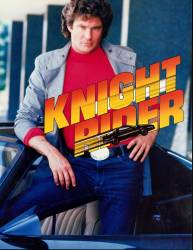Character mistake: The sign in front of the tank Lt. Ladd is trapped in reads "ORDINANCE TESTING FIELD, DANGER.", but an ordinance is a type of decree or law. They probably meant 'ordnance', which is another word for artillery.

Knight Rider (1982)
1 character mistake in season 1
Knight Rider [Pilot; a.k.a. Knight of the Phoenix] (1) - S1-E1
Continuity mistake: If you look closely at KITT throughout the pilot, the position of his scanner lens changes from being the normal scanner that we're all used to, and the scanner being at the very tip of the front bumper. (The latter case is because the car was used for a promo shots to sell to NBC, and after the show was picked up, they changed KITT's look, but still used the earlier shots).
Knight Rider [Pilot; a.k.a. Knight of the Phoenix] (1) - S1-E1
Devon Miles: Welcome aboard the Knight 2000.
Michael Long: Thank you. What's all this? It looks like Darth Vader's bathroom.
Devon: It's a one-of-a-kind car, Mr. Long. It is the fastest, safest, strongest car in the world. It is also completely fuel-efficient and it is operated entirely by microprocessors, which make it it virtually impossible for it to be involved in any mishap or collision. Unless, of course, specifically so ordered by the pilot.
Michael: Pilot? Don't tell me this thing flies.
Devon: No, but it thinks.
Michael: It thinks? My car thinks?
Devon: We like to think of it as our car.
Trivia: David Hasselhoff, who plays Michael Knight on Knight Rider, was married to Catherine Hickland from 1984-89 and in 1992 Catherine married an actor whose real name is Michael E. Knight.
Join the mailing list
Separate from membership, this is to get updates about mistakes in recent releases. Addresses are not passed on to any third party, and are used solely for direct communication from this site. You can unsubscribe at any time.
Check out the mistake & trivia books, on Kindle and in paperback.




Answer: I would say that unless there's visual evidence it was another K.I.T.T. car, as in you could see the bar scanner or cut steering wheel, people on here would correct the mistake by saying more than one 1982 Pontiac Firebird Trans-Am was sold and there's no reason it's meant to be a random car.
Bishop73